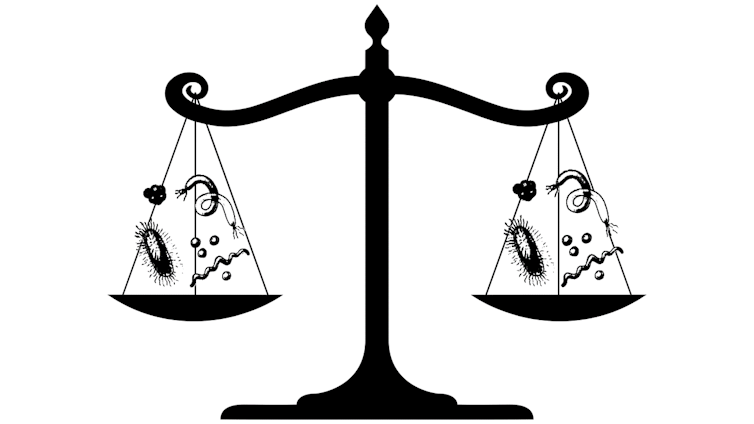Inequity takes a toll on your gut microbes, too
- Written by Sue Ishaq, Assistant Professor of Animal and Veterinary Sciences, University of Maine
People worry about having access to clean water, power, health care and healthy foods because they are essential for survival. But do they ever think about their access to microbes?
Every day, humans encounter microbes - in air, water, soil, food and buildings - and pick them up and leave them behind everywhere they go. Although you might be reaching for the hand sanitizer as you read this, many of these microbial exposures are beneficial to human health. But not everyone has equal access to good microbes.
Social equity is the practice of applying justice and fairness to our social policies. Society often measures it in terms of access. Do people have equal access to healthy food and clean water? Medical care? Safe housing? Parks and forests? My idea of “microbes and social equity” is rooted in the fact that we rely on the microbes that live in our bodies or in the environment around us. We need public policies that promote access to microbes.
I’m a gut microbiologist[1], and I want to understand the microbes that pass through our digestive tract and how they impact us. For example, human beings can’t digest plant fiber; we actually rely on several species of microbes[2] in our gut to do this, which provides us with the nutrients we need. Microbes also help “train” our immune cells[3] not to attack those trillions of microorganisms living in or on the body, thereby maintaining a delicate truce.
 Not all microbiomes are created equally.
Sue Ishaq, CC BY-SA[4]
Not all microbiomes are created equally.
Sue Ishaq, CC BY-SA[4]
Connecting with good microbes
I wanted to create a space to learn about and discuss the idea of “Microbes and Social Equity,” so I developed and taught a course at the University of Oregon during the summer of 2019. I focused on how access to basic necessities like nutritious foods (and especially fiber), pre- and postnatal health care, and green space and city parks could influence microbial exposures and individual experiences throughout a lifetime. These findings and discussions have now been published as a peer-reviewed essay in the journal PLoS Biology[5].
Fibrous foods recruit microbes in the gut, especially ones that break down and ferment complex plant carbohydrates in order to create energy for themselves. In doing so, they produce several molecules (like butyrate) that we use for energy, and they yield a number of health benefits.
The paper in PloS Biology provides examples of research on microbes and health, such as the benefit of a fiber-rich diet in recruiting beneficial gut microbes and reducing the symptoms of diabetes[6]. There are specific examples of social policies that might promote access to microbes, such as launching more school nutrition programs that require fruits and vegetables. There are also examples of policies with negative microbial impacts, such as inadequate food-service infrastructure in prisons, which can allow for the spread of foodborne illness.
 Providing a safe, supportive environment where women can nurse at work avoids situations like this.
Phoderstock/Shutterstock.com[7]
Providing a safe, supportive environment where women can nurse at work avoids situations like this.
Phoderstock/Shutterstock.com[7]
My students were especially interested in policies that support maternal health care and enable breastfeeding. Breast milk contains important components to boost the infant immune system, as well as a diverse community of bacteria, some of which support digestion of milk in the infant gut[8] and confer health benefits.
Infants who only receive formula recruit different gut microbes and are missing the ones derived from breast milk that protect against allergies[9] and other health problems. Policies that provide pre- and postnatal care are known to improve health outcomes for mothers and infants[10]. These policies also happen to support mother-infant microbial exposure, which can have huge health benefits. The lack of good policies may have the opposite effect: Many women identify a lack of social and infrastructural support as preventing them from breastfeeding their infants[11], which also deprives the babies of the microbes they need.
 Urban gardens are one way to encourage exposure to healthy microbes.
Joshua Resnick[12]
Urban gardens are one way to encourage exposure to healthy microbes.
Joshua Resnick[12]
Poor-quality city infrastructure leads to poor-quality health
The quality of the environment greatly impacts health. Plants are known to produce chemical compounds that benefit human health, and exposure to the diverse microbes found in the natural environment can keep our immune systems fit. Living near industrial areas exposes residents to lower air quality, contamination of water sources[13] with hazardous materials, noise pollution, and more. Worse, studies suggest that pollution-heavy industry is often intentionally placed in disadvantaged[14], low-income, or predominantly minority-resident neighborhoods because they lack the social capital to negotiate better zoning. And, heavily urbanized or industrial zones disperse different microbes[15] than a forest or park would, changing outdoor microbial exposure for residents of poorly planned neighborhoods.
Inequalities in access - such as only putting parks in wealthier neighborhoods - creates social inequity in resource distribution. But it also creates inequity in microbial exposure and may affect your health. However, zoning could be used to aid in the equitable distribution of resources.
Access is the basis for creating social equity. Globally, many governments have a legal obligation to provide access to a safe and healthy natural environment. If we consider that microbes are integral to maintaining public health, it follows that there is also a legal obligation to provide policy and infrastructure to enable equitable access to microbes.
This can be done by providing affordable maternal health care and parental leave to facilitate breastfeeding and train the immune system with good microbes.
 Industrial zones are particularly lacking in good microbes.
Judy Marie Stepanian, CC BY-SA[16][17]
Industrial zones are particularly lacking in good microbes.
Judy Marie Stepanian, CC BY-SA[16][17]
It can be done with access to an affordable, high-quality diet with lots of fiber, especially by making healthy food available in public schools, prisons and “food deserts” with inadequate shopping options.
It can also be done by equitably distributing natural environments and green space in urban settings. Encouraging urban farms, local farmers’ markets, bike lanes and walking paths, and giving stores incentives to stock and sell healthy food items, can make urban and rural areas healthier by promoting physical activity, good food, clean air and water and diverse microbial exposures.
[ Like what you’ve read? Want more? Sign up for The Conversation’s daily newsletter[18]. ]
References
- ^ I’m a gut microbiologist (sueishaqlab.org)
- ^ we actually rely on several species of microbes (doi.org)
- ^ Microbes also help “train” our immune cells (doi.org)
- ^ CC BY-SA (creativecommons.org)
- ^ peer-reviewed essay in the journal PLoS Biology (doi.org)
- ^ gut microbes and reducing the symptoms of diabetes (doi.org)
- ^ Phoderstock/Shutterstock.com (www.shutterstock.com)
- ^ support digestion of milk in the infant gut (doi.org)
- ^ breast milk that protect against allergies (doi.org)
- ^ improve health outcomes for mothers and infants (www.ncbi.nlm.nih.gov)
- ^ preventing them from breastfeeding their infants (www.ncbi.nlm.nih.gov)
- ^ Joshua Resnick (www.shutterstock.com)
- ^ residents to lower air quality, contamination of water sources (doi.org)
- ^ pollution-heavy industry is often intentionally placed in disadvantaged (doi.org)
- ^ industrial zones disperse different microbes (doi.org)
- ^ Judy Marie Stepanian (www.shutterstock.com)
- ^ CC BY-SA (creativecommons.org)
- ^ Sign up for The Conversation’s daily newsletter (theconversation.com)
Authors: Sue Ishaq, Assistant Professor of Animal and Veterinary Sciences, University of Maine
Read more http://theconversation.com/inequity-takes-a-toll-on-your-gut-microbes-too-127659

